The rights and health of refugees, migrants and stateless must be protected in COVID-19 response
Geneva, 31 March 2020.
In the face of the COVID-19 crisis, we are all vulnerable. The virus has shown that it does not discriminate – but many refugees, those forcibly displaced, the stateless and migrants are at heightened risk.
Three-quarters of the world’s refugees and many migrants are hosted in developing regions where health systems are already overwhelmed and under-capacitated. Many live in overcrowded camps, settlements, makeshift shelters or reception centers, where they lack adequate access to health services, clean water and sanitation.
The situation for refugees and migrants held in formal and informal places of detention, in cramped and unsanitary conditions, is particularly worrying. Considering the lethal consequences a COVID-19 outbreak would have, they should be released without delay. Migrant children and their families and those detained without a sufficient legal basis should be immediately released.
This disease can be controlled only if there is an inclusive approach which protects every individual’s rights to life and health. Migrants and refugees are disproportionately vulnerable to exclusion, stigma and discrimination, particularly when undocumented. To avert a catastrophe, governments must do all they can to protect the rights and the health of everyone. Protecting the rights and the health of all people will in fact help control the spread of the virus.
It is vital that everyone, including all migrants and refugees, are ensured equal access to health services and are effectively included in national responses to COVID-19, including prevention, testing and treatment. Inclusion will help not only to protect the rights of refugees and migrants, but will also serve to protect public health and stem the global spread of COVID-19. While many nations protect and host refugee and migrant populations, they are often not equipped to respond to crises such as COVID-19. To ensure refugees and migrants have adequate access to national health services, States may need additional financial support. This is where the world’s financial institutions can play a leading role in making funds available.
While countries are closing their borders and limiting cross-border movements, there are ways to manage border restrictions in a manner which respects international human rights and refugee protection standards, including the principle of non-refoulement, through quarantine and health checks.
More than ever, as COVID-19 poses a global threat to our collective humanity, our primary focus should be on the preservation of life, regardless of status. This crisis demands a coherent, effective international approach that leaves no-one behind. At this crucial moment we all need to rally around a common objective, fighting this deadly virus. Many refugees, displaced, stateless people and migrants have skills and resources that can also be part of the solution.
We cannot allow fear or intolerance to undermine rights or compromise the effectiveness of responses to the global pandemic. We are all in this together. We can only defeat this virus when each and every one of us is protected.
ENDS
For more information on this topic, please contact:
OHCHR: Rupert Colville, +41 22 917 97 67, [email protected]
IOM: Leonard Doyle, +41 79 285 71 23, [email protected]
UNHCR: Cecile Pouilly, + 41 79 108 26 25, [email protected]
WHO: Tarik Jašarević, +41 793 676 214, [email protected]
Page 5 of 20
-
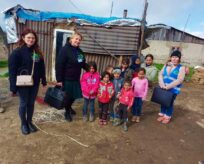
Improving services of the Free Legal Aid Centers for undocumented people
19 Jul 2023The World Bank estimated there were 395,863 persons without an identity document (ID) in Ukraine at the end of 2021. Forced displacement due to the ongoing full-scale invasion in Ukraine can increase the risk that people are unable to prove their identity because they may have lost or damaged documents, […]
-
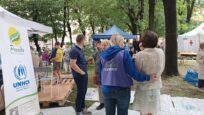
At the site of Lviv missile attack: Sharing and easing pain of losing the loved ones
14 Jul 2023“I live about 5 kilometres away from where the missiles hit but the sound of the explosion was so loud that I immediately thought the scale of destruction might be immense,” recalls Andrii Rudyk who provides legal assistance at UNHCR’s NGO partner NEEKA office in Lviv. Around 3 am on […]
-
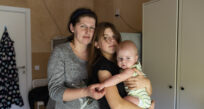
Majority of displaced Ukrainians plan or hope to return home as war hits 500-days mark
10 Jul 2023As the full-scale war on Ukraine reached a 500-day mark, an absolute majority of Ukrainians displaced as refugees abroad or inside the country report still express a hope and intention to return home, the UN Refugee Agency (UNHCR)’s latest survey reveals. Seventy-six per cent of refugees surveyed by UNHCR in […]
-
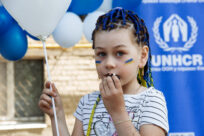
Pockets of joy for Ukrainian children in times of war
6 Jul 2023With her bright yellow and blue braids – colours of the Ukrainian flag – 7-year-old Anastasiia is excited to be joining an outdoor activity for displaced children in Kharkiv, the second largest city in Ukraine, organized by UNHCR’s local partner Proliska. Her mother, Nelia, is relieved to see her daughter […]
-
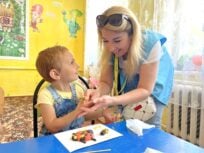
World Refugee Day in Ukraine: Hope Away from Home for Millions of Ukrainians
3 Jul 2023The World Refugee Day, observed globally on 20 June, was commemorated in Ukraine through more than 30 events organized by UNHCR and its NGO partners. Ranging from information sessions to open-air gatherings and photo installations, the events shed light on the unwavering courage and resilience of those forced to flee […]
-
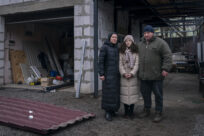
Home repairs help restore Ukrainian communities shattered by war
30 Jun 2023For the past 30 years, Liudmyla Bantsyr has grown vegetables on a large plot of land beside her house in Ozershchyna, a rural village an hour west of Kyiv. Now aged 70, she still harvests hundreds of kilograms of potatoes each year by hand, storing them for the months ahead […]
-
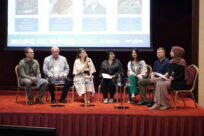
On World Refugee Day, UNHCR spotlights initiatives and actions that give internally displaced people and refugees hope and possibilities to actively contribute
20 Jun 202320 June 2023, Kyiv, Ukraine – Today, the United Nations High Commissioner for Refugees (UNHCR) in Ukraine marked World Refugee Day with an event focused on initiatives and actions that help people who have been forcibly displaced actively participate and be fully included in housing, job and social programs in […]
-
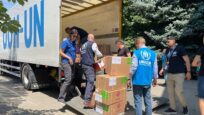
Responding to the Kakhovka dam emergency
16 Jun 2023The destruction of the Kakhovka dam on 6 June resulted in the extensive flooding of settlements in the region. Tens of thousands of people in areas controlled by the Government of Ukraine have reportedly been impacted by the flooding, with about 3,000 having been evacuated or having left the area, […]
-

“The city is not buildings; it is people”. Youth activist from Mariupol helps to develop an integration hub in Mukachevo
15 Jun 2023Dariia Markovych hails from Mariupol in southern Ukraine. An active citizen, she was one of the dedicated members of the Mariupol Youth Council, launching programs for youth entrepreneurship and providing grants for the development of business projects created by young people. When the full-scale invasion reached Mariupol in March, Dariia hoped […]
-
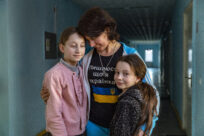
UNHCR calls for concerted action as forced displacement hits new record in 2022
14 Jun 2023Increase last year was driven by war in Ukraine and revised estimates for Afghan refugees; further fighting, especially in Sudan, has now pushed global total to 110 million The full-scale war in Ukraine, alongside conflict elsewhere and climate-driven upheaval meant more people than ever remained uprooted from their homes last […]
